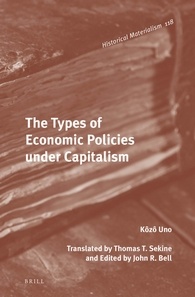Kôzô Uno (Translated by Thomas T. Sekine and edited by John R. Bell)
Uno, who proposes to study capitalism at three distinct levels of abstraction, insists that there should be a mid-range theory of its developmental stages (dankaïron) between the pure theory of capital, which must be couched in the form of Hegelian dialectic (genriron), and capitalist histories which must be recounted with full empirical detail. In this book he illustrates how he would himself expose that mid-range theory, by summarising the three types of economic policy that the bourgeois state successively adopted: mercantilism, liberalism and imperialism. He moreover indicates that economics can relate and cross-fertilise with other branches of social science, such as law and politics, only at this level of abstraction, thus achieving an adequate theory of the bourgeois state. Nowhere else is Marx’s insight into ‘the state as the epitome of bourgeois society’ more vividly endorsed than in this book.
First published in Japanese as Keizai-Seisakuron by Kobundo, Ltd. in 1936. The current work is a translation of the enlarged and revised edition of 1971.
Biographical note
Kozo Uno (1897–1977) was a Japanese Marxian economist who made many path-breaking contributions to Marx’s theory of value.
Readership
Economists, scholars working on Marxist value-theory, economic history, or the bourgeois state, and students of post-war Japanese intellectual culture.
Table of contents
List of Tables … ix
Foreword to the Revised Edition of 1971 … xi
Introduction … 1
1 The Commodity-Economy and Economic Policies … 1
2 The Task and Method of the Study of Economic Policies … 8
3 The Study of Economic Policies and Economics … 16
Part I: Mercantilism
Introduction to Part I … 35
1 The Formative Period of Capitalism … 37
2 The English Wool Industry as Representing Merchant Capital … 41
3 Economic Policies of Mercantilism … 48
1 The System of Royal Charters to Monopolies … 51
2 The Navigation Acts … 54
3 Commercial Policies … 55
4 The Corn Laws … 56
PART II: Liberalism
Introduction to Part II … 63
4 The Period of the Self-Propelled Growth of Capitalism … 67
5 The British Cotton Industry as Representing Industrial Capital … 77
1 Mechanisation of Cotton Manufacturing … 77
2 The Development of the Cotton Industry … 80
3 The British Cotton Industry and International Trade … 87
6 Economic Policies of Liberalism … 99
1 Free Trade Movement in Britain … 100
2 Internationalisation of the Free Trade Movement as a Sequel to Its Success in Britain … 116
3 Tariff Protectionism in the United States … 124
4 Free Trade and Tariff Protection … 132
Part III: Imperialism
Introduction to Part III … 137
7 Capitalism in Its Decline … 144
1 The Concentration of Capital and the Bulking Large of Fixed Capital … 144
2 The Functioning of the Joint-Stock Company … 149
a. The Capital of a Joint-Stock Company … 150
b. Joint-Stock Companies and Banks … 155
c. The Joint-Stock Company as Means of Concentrating Managerial Control … 161
3 The Mode of Accumulation of Finance-Capital … 166
8 Multiple Faces of Finance-Capital … 173
1 The Development of Monopoly Organisations in and around the Heavy Industries in Germany … 175
2 Britain’s Overseas Investment … 188
3 The Trust Movement in the United States … 197
9 Economic Policies of Imperialism … 207
1 Customs Policy and Dumping … 210
2 The Acquisition of Colonies and the Export of Capital … 221
Conclusion … 234
Memorandum on Capitalist Development after the First World War (1970) … 237
Translator’s Afterword … 242
Appendices: Two Essays by Thomas T. Sekine
Appendix 1: An Essay on Uno’s Stages-Theory of Capitalist Development: What Might We Learn from This Book? … 247
Appendix 2: An Essay on Transition away from Capitalism: How Might Unoists Account for the Evolution of the post-1914 World Economy? … 287
References … 326
Index … 332

